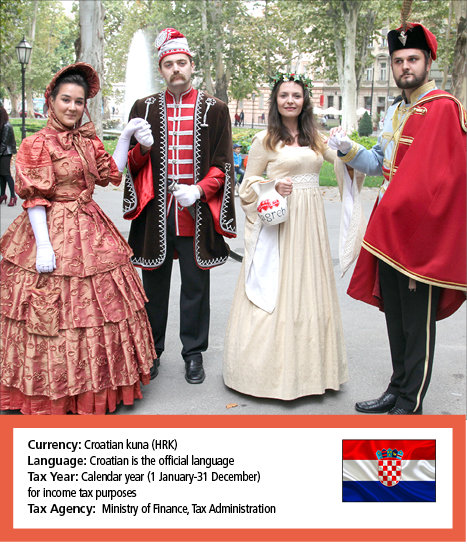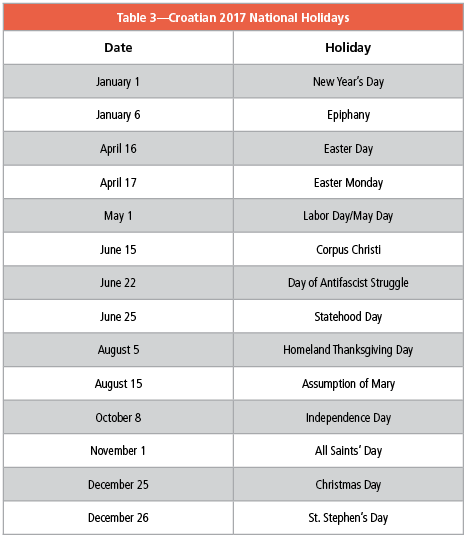
The Republic of Croatia is located in Southeastern Europe, bordering the Adriatic Sea between Bosnia and Herzegovina and Slovenia. Croatia declared its independence from Yugoslavia in 1991 and is a member of NATO and the European Union (EU). The country of 4.3 million people is rebounding from an economic slowdown in 2008 and still faces challenges of high unemployment and a difficult investment climate. National leaders simplified the tax code in 2016 to stimulate domestic growth and foreign investment.
Applicable Laws
The main laws that regulate employment in the Republic of Croatia include labour acts, wage directives, social security acts, and employment protection acts. Employers, employees, and trade unions can stipulate working conditions more favourable to the employees than the ones prescribed by the Croatian labour acts as well as less favourable if authorised to do so.
Labour wages in Croatia are regulated by laws, collective contracts, individual contracts, and by internal company bylaws. Government regulations determine the minimum wage for each year, and the minimum wage is increasing parallel with the real GDP growth from the previous year. According to the Croatian Government, for the period of January 1-December 31, 2017, the minimum wage is set at Croatian kuna (HRK) 3,276,00 (EUR 437,00—currency rate 1 EUR–7,5 HRK).
Social Insurance Foundation
 Social security contributions are payable by the employer and employee (see Table 1). The rates are:
Social security contributions are payable by the employer and employee (see Table 1). The rates are:
Employer: 17.2% calculated and paid on top of the gross salary
Employee: 20% calculated and deducted from the gross salary
Pension fund contributions are paid in two pillars. The first pillar is 15% and is based on generation solidarity, meaning current retirements are paid out from these funds. The second pillar is 5% and is personal for each employee.
There is a maximum annual base for first pillar contribution calculations, and for 2017 this is HRK 557,208.00. If an employee crosses this base during the year, only the 5% for the second pillar is calculated. There is also a minimum monthly base for pension contributions, and for 2017 it is HRK 2,940.82.
Personal Income Tax
Taxable income is gross salary minus 20% for pension contributions. Taxable base is the difference between taxable income and the tax relief of each employee (personal allowance).
The basic personal allowance (the nontaxable part of income) is HRK 3,800.00.
 The allowance amount can vary from employee to employee, since it increases based on the number of dependent family members.
The allowance amount can vary from employee to employee, since it increases based on the number of dependent family members.
The tax scale by which taxable individual income is taxed is indicated in Table 2.
Calculated income tax is the base for any additional city surtax, which varies depending on the employee's city of residence from 0 to 18%.
Employment Procedure
When employing personnel, the employer must keep records of employees and must present these records upon request from a Labour Inspector. At the beginning of employment, a written employment contract must be completed. Employment contracts can be either of definite or indefinite duration. The essential elements an employment contract must include are the following:
- Contracting parties and their permanent residence
- The place and nature of work
- Date of commencement and termination in case of a definite duration contract
- Duration of paid annual leave
- Basic salary
- Working hours
- Notices
An employment contract can be for a full-time or part-time working arrangement. The statutory full-time working hours cannot exceed 40 hours per week. Time schedules can be arranged differently so that an employee can work more than 40 hours in some weeks and fewer than 40 hours in others. Such a schedule is not considered as overtime work provided that certain legal requirements are met. Overtime work is possible in specific cases. Overtime work cannot exceed 180 hours per year or 50 hours per week, while collective agreements can allow 250 hours of overtime yearly. Minors are prohibited from working overtime.
Payroll Calculation Procedure
Monthly payroll calculation depends on the number of days or hours the employee has worked during the relevant month. The gross salary is calculated, and then all statutory contributions regarding wage tax and social security are calculated and deducted from the monthly gross salary. The net salary is paid to the employee, while the deductions are forwarded to the relevant authorities.
Tax Residents
Workers in Croatia become tax residents if they stay for at least 183 days under circumstances that indicate their visit is not temporary. The 183-day visit may overlap calendar years.
People may also be declared tax residents if they have a residence in Croatia at their exclusive and continuous disposal for at least 183 days under circumstances that indicate they intend to keep and use that accommodation. Again, this period may overlap calendar years.
Croatia has no wealth tax, and the following income is tax-free:
- Pensions received from abroad
- Interest payments on loans, investments, securities, deposits with financial
institutions, and similar incomes
- Capital gains from trading securities and other financial assets
- Capital gains from real estate if the person occupied the property, held it more than three years, or sold it to a spouse or an immediate family member
- Inheritance and gifts are exempt from taxation in the first line of succession. (In other cases, there is a flat rate of 5%.)
Foreigners are subject to tax on the following forms of Croatian income:
- Income from employment that is received in Croatia or from work in Croatia
- Income from a business in Croatia
- Income from real estate in Croatia
- Income from one’s own or chartered marine ships/aircraft used for dispatching goods or people from Croatian ports/airports
- Income from independent personal activities (deliveries of goods or rendering of services) that are carried out in Croatia or abroad, and are used for the performance of an activity in Croatia
- Income from capital or insurance that originates from within Croatia.
Protection of Employment
 Annual Leave—Each employee who has worked at least six months with the same employer has the right to a paid annual leave of at least four weeks for each calendar year. Leave days over the aforementioned limit must be stipulated in the employment contract or by a collective agreement. Employees with fewer than six months of service with the employer are entitled to a proportion of the annual leave equal to 1/12 of the annual leave for each full month of work. Holidays, non-working days, and sick leave days cannot be calculated as annual paid leave (see Table 3 for a list of holidays). An employee has the right to take annual leave in two parts, unless otherwise agreed by the employer or stated in the employment contract. In such cases, the first part of the annual leave must last at least two weeks.
Annual Leave—Each employee who has worked at least six months with the same employer has the right to a paid annual leave of at least four weeks for each calendar year. Leave days over the aforementioned limit must be stipulated in the employment contract or by a collective agreement. Employees with fewer than six months of service with the employer are entitled to a proportion of the annual leave equal to 1/12 of the annual leave for each full month of work. Holidays, non-working days, and sick leave days cannot be calculated as annual paid leave (see Table 3 for a list of holidays). An employee has the right to take annual leave in two parts, unless otherwise agreed by the employer or stated in the employment contract. In such cases, the first part of the annual leave must last at least two weeks.
Illness—Each employee has the right to a sick leave for the whole period of sickness until a medical doctor confirms the employee is able to return to his or her working duties, or until the Pension Committee declares a permanent lack of ability for work.
During sick leave, the employer must pay the employee’s salary for the first 42 days of illness. From the 43rd day onward, the employee is compensated by the Croatian Health Insurance Fund for at least 70% of his/her average salary for the past six months. In special cases, the Health Fund can cover 100% of the employee’s salary.
Maternity—An employer cannot refuse to hire a pregnant woman or terminate her employment contract due to her pregnancy. Furthermore, information regarding the employee’s pregnancy is strictly confidential and the employer is not allowed to inquire.
The employee is entitled to maternity leave from the 28th to the 45th day prior to birth until six months after the birth of a child and to an additional six months of parental leave. Parental leave can be extended to 30 months depending on the number of children. The parental leave can be given to either of the two parents. During maternity and parental leave, an employee is compensated by the Croatian Fund for Health Insurance according to the employee’s average salary during the past six months for the maternity leave and according to a limit set by the state for the parental leave (approx. €350).
Termination of Employment
An employment contract ends in the following cases:
- Upon death of the employee
- Upon death or upon liquidation or bankruptcy of the employer
- Expiration of a fixed-duration contract
- When the employee has reached the age of 65 years or completed 15 years of social insurance
- Upon mutual agreement
- Upon a legally effective decision due to inability to work
- By cancellation
- By court decision when authorised
When terminating an employment contract, the employer must prepare a notice of dismissal in writing, give reasons for the dismissal in writing, and serve the employee with the notice.
In cases of regular notice, the notice period lasts between two weeks and three months depending on the time the employee has worked continuously for the same employer. The notice period starts running on the day the notice is served and cannot run during pregnancy, maternity, parental, and adoption leave, or work with shortened hours. On termination, the employee is entitled to all statutory compensation regarding salaries, unused paid leave days, etc.
 Afrodita Taći is the Head of Accounting and Payroll Services at Eurofast Global d.o.o. in Croatia. She has more than eight years of experience in accounting and payroll for foreign multinational companies. Taći’s expertise is in statutory and management reporting in accordance with local regulations and working with International Financial Reporting Standards (IFRS).
Afrodita Taći is the Head of Accounting and Payroll Services at Eurofast Global d.o.o. in Croatia. She has more than eight years of experience in accounting and payroll for foreign multinational companies. Taći’s expertise is in statutory and management reporting in accordance with local regulations and working with International Financial Reporting Standards (IFRS).
Web Resources
The Government of the Republic of Croatia
https://vlada.gov.hr/en
Republic of Croatia Ministry of Finance
http://mfin.hr/en
Republic of Croatia Tax Administration
http://www.porezna-uprava.hr/en/Pages/default.aspx